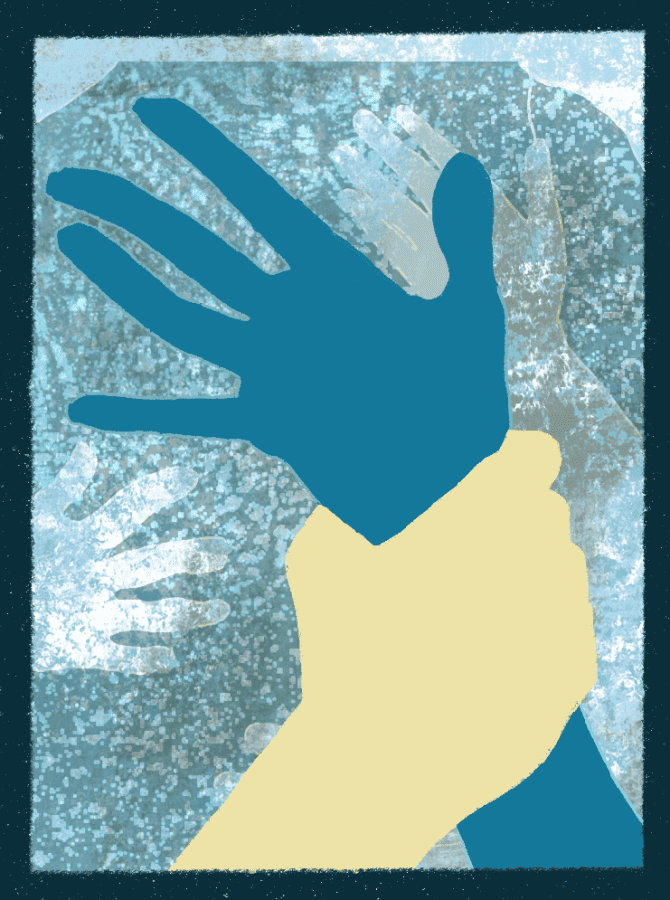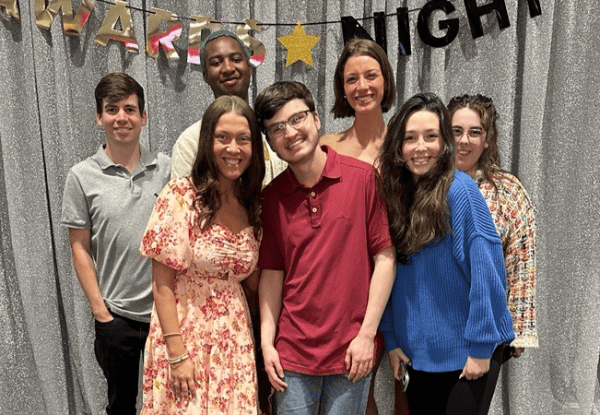Opinion | Consent campaigns are getting it wrong
February 1, 2023
“Consent is a pathetic standard of equal sex for a free people.” – Catherine Mackinnon, 2016
Disclaimer: In this article, I draw connections between sexual violence and normative heterosexuality by examining how patriarchy contributes to the prominent violence perpetrated by men against women. The stance reflected in this article does not negate violence that occurs amongst other groups, but rather analyzes the societal factors that contribute to the campus sexual violence epidemic.
Trigger warning: This article discusses themes of sexual violence. Be sure to prioritize your own mental health when reading.
*Names in this article have been changed to protect the identities of interview subjects.
I thought I understood consent. Mandatory lectures hosted in dorm common rooms and in my women’s studies classes harped on the necessary boxes to check for “consensual” sex. Throughout my formative years, I absorbed every kind of consent campaign. Despite this, I was sexually assaulted during my first year of college and I didn’t even realize it. The offender did it in a way that was far more insidious than I ever knew was possible.
I am now a senior at The University of Alabama, and I’ve been working with survivors since my freshman year. By listening to their stories, I realized that singular solutions to sexual violence, like consent education campaigns, are often ineffective and uphold ideas that perpetuate and justify sexual violence.
For a long time, I wasn’t able to verbalize the problems I’d seen with popular campaigns and how they had failed to protect me and others. Although it’s scary to critique these campaigns when they are one of the few tactics being used to address consent on an institutional level, it is a necessary and pivotal conversation to be started.
I argue that mainstream adoption of the verbal consent-dominant approach has distracted us from the true root of the problem: one person feeling the need to dominate another.
“A consent-focused model is inadequate not only because it is too low a standard of consent, but also because it fails to address the ways in which sexual behaviour is socially constructed,” said Melanie Beres, a leading scholar on consent.
Here’s the bottom line: sexual violence is not caused by miscommunication. The simplistic approach to consent obscures and justifies sexual violence. When we paint this image of sexual violence, we inadvertently create a false dichotomy that puts the responsibility to say “yes” or “no” entirely on the woman, while using ideals that aid the actions of men, paving the way to ensnare women into verbal contracts they haven’t agreed to. The problem is not a lack of clearly communicated nonconsent but rather the culturally designed desire for power and control that is more commonly conditioned into men. For this reason, the modern, consent-dominant framework is being used to justify existing behaviors rather than address the root of those behaviors.
These campaigns perpetuate and uphold the narrative that women are typically gatekeepers and men are typically initiators, shifting responsibility and blame to women while still framing men as the primary sexual agents.
In a series of interviews, I asked UA students about their perceptions of consent. The expectation for women to gatekeep their own bodies was apparent in the stories shared.
“The second [he] had the opportunity to make a questionable decision that I didn’t really have the toolkit to say ‘yes’ or ‘no’ to, [he] took that opportunity and absolutely ran with it,” Sarah*, a junior, recounted her sexual assault in our interview, talking candidly for the first time about the details.
Although women are socialized to be non-violent and soft-spoken, we are expected to suddenly become confrontational and aggressive in unwanted sexual situations. Not only does the expectation require flawless navigation of complex social encounters in order to stay safe, it also inherently imposes blame on those who don’t fulfill it. Sarah didn’t report her sexual assault because of this.
“It feels a lot more like I’m not allowed to talk about it because I don’t know how much of it is my fault,” she said.
I asked Katie*, a senior, what her experience was with navigating consent. She paused and told me that she had never been asked for consent, pointing out that voicing nonconsent is often dismissed, saying that “if you do try to voice anything against it, they will try to persuade you.”
This illustrates another emerging crack in the consent-dominant approach.. Consent is purely for public perception — a box to check for legal and social safety. Once an impression of consent is achieved, they have permission to do whatever they want beyond the physical cues and silence of their partner.
Upholding these views allows for men to do anything just to check that box and obscures what could — and often should — be considered sexual violence. Many women “consent” for the sake of appeasing the other party, knowing that a “yes” is the only thing that will be taken at face value.
“I don’t think consent is just the ‘yes’ or ‘no’ right before someone has sex with you. If anything I don’t think that’s even a valid time to ask,” said Grace*, a senior. “I think it’s just covering your a–. You need consent for everything.”
Painting one-word consent as the only important factor in sexual situations lends itself to a view of sex as singular, rather than a series of interrelated actions. We should create a culture where consent is not something to achieve, but rather it’s a bottom line of understanding and respect that ought to exist during the entirety of all relationships.
Modern means of sexual violence prevention that ignore the social context of sexual relationships have created a new strain of sexual violence that is safer for the perpetrator than ever. Men who have coerced and pressured women into saying “yes” are possibly even more dangerous because they are socially protected and legally bulletproof. A consent framework allows for men to polish their existing behavior into something other than sexual violence. From that is born the “champions of women,” the men who have not undone their affinity for power and control yet are praised and adored because they make sure, by any means possible, that they get the “yes” before exerting this entitlement.
The tangible effects of these findings can be seen in one University of Alabama organization that serves as the perfect case study: Men Against Rape and Sexual Assault.
Founded in 2019, this group has pledged to be “leaders on campus who educate other students on how to prevent rape and sexual assault, and how to help those who survive rape and sexual assault.” MARS was founded as an initiative of Not On My Campus, which has existed since 2015 and completed numerous successful projects such as opening the SAFE Center, a Tuscaloosa sexual assault crisis center.
MARS intended to facilitate peer education presentations at different fraternity houses. In 2020, they completed three of those training sessions. In 2021, they completed zero. In 2022, they completed one.
They were highly regarded on campus, seen as a beacon of trust among female students. During this time, members indulged in this status.
An interview with Jane*, a former member of NOMC’s executive board, reflected this. However, Jane revealed to me that she was sexually coerced in fall of 2020. The perpetrator was a MARS representative. She recalled a sense of trust being broken, thinking, “he’s a great guy, he’s in MARS.” After sharing this story to a member of MARS exec shortly after, she stated that “nothing happened.” MARS was on his side.
Following this incident, Jane noted that MARS became very difficult for NOMC to work with. “I feel like if you’re genuine, you shouldn’t have to be begged to go to something,” pointing out that she had a lot of trouble getting MARS to attend NOMC events.
Jane noticed that when she continually asked MARS to integrate survivor voices, she was brushed off with apathy or even irritation.
All the while, members of MARS continued garnering trust, only to break it. Sarah was sexually assaulted by a member of MARS.
“I felt like I could invite him into my house because he was like ‘Oh, I’m in MARS,’” she said.“ I didn’t think about why [MARS] would be harmful to women until that happened to me.”
A quiet interview with Clara*, another survivor who was sexually assaulted by a MARS representative, exhibited another common theme: women not only trusted the individuals in the organization, they also placed their trust in the integrity of the organization as a whole to achieve its mission.
“He had sexually assaulted me before he applied to MARS,” she recalled. “[He] was able to recognize that what he did was wrong, so I was like ‘You got into MARS, now you’re going to use this position to make sure nobody else does what you did.’ He did not end up doing that. He went on to rape two other girls.”
But that wasn’t it. Sarah and Jane also revealed something even more shocking: a member of MARS’ executive board had deliberately covered up a rape from another executive member. He pushed the complaints aside and continued to work with the perpetrator, using a MARS endorsement to propel his campaign for SGA.
“I guess his campaign and winning was more important than doing the right thing,” Jane commented.
Whether it was refusal to integrate female voices, failure to punish predators within their own membership or general misunderstanding about the weight of the issue they were addressing, MARS consistently failed in their mission.
“There’s really a lack of care that they’re showing in the face of something really significant,” Dylan*, a former member of MARS’ executive board, said. “I just don’t see it as an effective means of combatting sexual assault in any way.”
Hannah*, founder of NOMC, noted that the creation of MARS, “fits within this larger context of women putting in the groundwork … but it only then becomes something taken seriously when men attach their name to it.”
On March 3rd, 2022, MARS released a statement on their Instagram that revealed one of their members displayed a pattern of behaviors that resulted in their suspension. The statement has since been deleted, but it is still on record:
“On the evening of Thursday, March 3, MARS received new of disturbing allegations against one of our representatives, detailing a pattern of alleged sexual assault and rape. After consulting with our advisor from the Women and Gender Resource Center (WGRC), our executive board voted unanimously to suspend the individual from our organization, pending a formal hearing and potential full expulsion at our meeting next week, as per our organization bylaws. We are taking every step possible within our constitution to remove the individual from MARS immediately. MARS takes these allegations incredibly seriously and is working with all relevant authorities to ensure justice is served.”
Dylan recalled that while a couple members of the executive board took the situation seriously, he was “alarmed by the lack of urgency or an understanding of the severity of the situation by people in the organization.” Following the statement, NOMC publicly disaffiliated with MARS. Dylan resigned from his position within the executive board. It seemed like a lesson had been learned.
However, the statement has since been deleted. Now, MARS is recruiting once again.
“In the beginning, I don’t think anyone really thought they had bad intentions,” Jane concluded. “But it turned into something that I could not have imagined and I don’t think anyone could have.”
How did the very organization that promised to be better –– to be “Men Against Rape and Sexual Assault” –– become an organization comprised of men that have silenced cases of sexual assault, have been cited by multiple women as pressuring them to engage in sexual activity, and created a boys-only club against rape and sexual assault? The consent-centered framework as a means to prevent sexual assault created the perfect environment for MARS to exist. When we lend our narratives to male action, society continues to solely value male voices and male actions. MARS uplifts and upholds solely male voices while addressing a crime in which 83% of victims are female. I guess they truly believe that men are from MARS and women are from Venus.
Nonetheless, MARS is not unique. The person who sexually assaulted me was not a member of MARS, but he took advantage of the framework, harboring my trust by self-proclaiming himself as a good and modern man, and an activist. The fight is much bigger than my story or this club. We have to change the social culture on this campus.
The consent-centered framework has justified and obscured sexual violence while placating social movements and protecting perpetrators. Instead of preaching, “just get the yes,” we should be raising a generation of individuals who don’t want power and control over each other. We should be giving all young people the tools to know their own boundaries and set them. We should reject the narrative that sex is something done to women and understand that sex should be built on mutual desire. Only then the obscuration of sexual violence is undone and we can effectively fight sexual violence.
Here’s what it comes down to: whether we’re talking about fraternity gentlemen assaulting each other in basements, corrupt structures in student government or men who are wolves in sheeps’ clothing, we need to cultivate a society where we don’t want to dominate each other.
Yes, I was sexually assaulted during my first year of college. Yes, there are many others like me. But I don’t want people to be shocked or scared by the stories I’ve shared. I want you to examine this with empathy and understanding rather than with fear that stagnates the very communities we are trying to heal. These findings open up a space for meaningful change, only if you, the audience, will listen. So listen.
UA Resources:
- Women and Gender Resource Center phone number: (205) 348-5040 from 8am-5pm whenever the University is open.
- You can also call UAPD at (205) 348-5454 and ask to speak to a WGRC victim advocate who is on call 24/7, even on weekends and holidays.
- SAFE Center phone number: (205) 860-7233
Other Resources:
- National Sexual Assault Hotline: 1-800-656-4673
- Or chat live at www.online.rainn.org
Rachel Jakovac is a senior at the University of Alabama, studying political science and marketing. She began advocating for survivors of sexual violence during her freshman year when she started working at the Women and Gender Resource Center, which has lead her to speak to hundreds of students across campus, mentor students at Skyland Elementary, and organize advocacy events. That work inspired her to start her 501(c)(3) non-profit, End The Silence, which helps survivors of interpersonal violence heal through various projects across the country, including the ETS Scholarship Fund, which is accepting applicants this spring.










